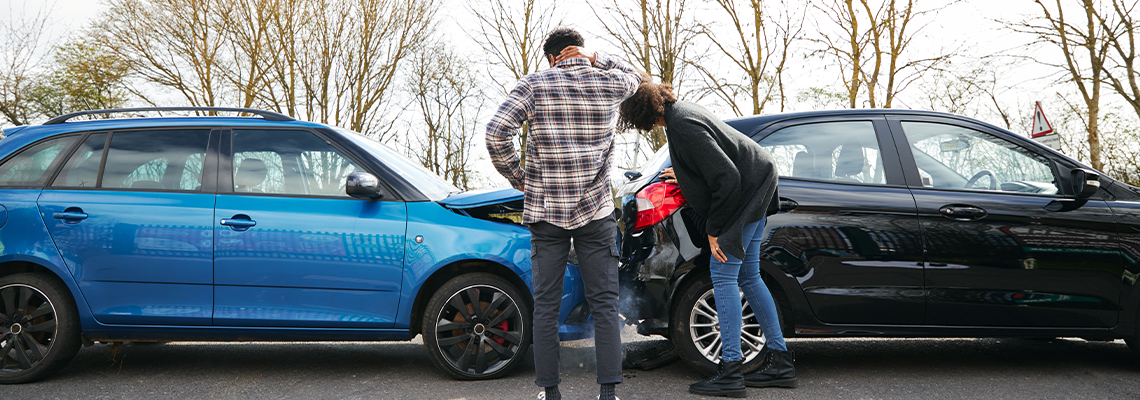Semi truck accidents, often involving large commercial vehicles like tractor-trailers, are among the most devastating incidents on Missouri’s roads. Due to their size, weight, and operational intricacy, these accidents frequently result in severe injuries, fatalities, and significant property damage.

What Should I Do If I Know the Accident Was My Fault?
You probably know that if you get injured due to someone else’s fault, you can claim compensation for your medical expenses and other losses. But what happens if you think you are responsible for your accident? And what should you do when you think the accident was your fault?
These are tough questions to answer without knowing the details of your specific situation. As personal injury attorneys at SJP Sifers Jensen Palmer, we know how stressful and frustrating the aftermath of an accident can be, especially when you think your fault contributed to the accident.
However, we also know that people aren’t always right when they think they were at fault for an accident. If your accident occurred in Kansas City, Missouri, or other parts of the Kansas City metropolitan area, reach out to our office so we can determine fault and advise you on your legal options.
No Matter What, Don't Admit Your Fault
In the heat of the moment following an accident, emotions can run high. You might feel the urge to apologize or admit fault, thinking it’s the right thing to do. However, this can have serious legal and financial repercussions.
Admitting fault on the scene can automatically place you at a disadvantage, even if later investigations reveal that the accident wasn’t entirely your fault. Admittance of fault can—and most likely will—be used against you by the other party’s insurance company to claim higher damages, which can affect your insurance rates and financial liability.
Another thing to consider is that determining fault isn’t always straightforward and it’s nearly impossible to say with 100% certainty that someone was at fault without conducting an in-depth investigation.
Liability in Missouri
Missouri follows the legal principle of "pure comparative negligence," which means that more than one party can be found at fault for an accident. In simple terms, even if you think you’re responsible, the other driver might also share some of the blame. For example, if you were speeding but the other driver ran a red light, both parties could be assigned a percentage of fault. Your financial responsibility would then be adjusted based on your percentage of fault.
Example. For instance, if you’re deemed 30% responsible for the accident and the total damages amount to $10,000, you would still be eligible to receive $7,000 (70% of the total damages).
This system encourages fairness and ensures that each party bears responsibility proportionate to their contribution to the accident. However, it also highlights the importance of not admitting fault prematurely, as doing so could skew the fault distribution against you.
Do You Need an Attorney if You Think the Accident Was Your Fault?
Believing you’re at fault doesn’t necessarily mean you’re not entitled to compensation, nor does it mean that your assessment of fault is correct. Multiple factors can influence the determination of fault, and you might not have all the facts immediately after the accident. For example, you could be in a situation where a car manufacturer is liable for the accident.
The decision to hire or not to hire an attorney is entirely up to you. This applies to situations when you think the accident was your fault or when you know that the other party was at fault. However, proceeding with your claim without an attorney could put you at a disadvantage. Your attorney will make sure you aren’t blamed for any fault you’re not liable for. As mentioned earlier, Missouri is a pure comparative negligence state, which means your compensation will be reduced in proportion to your degree of fault.
When the insurer knows you were partially at fault, you may have a hard time trying to collect any compensation whatsoever, as every insurance company is a profit-driven business looking to minimize its liability and pay claimants as little as possible. Your attorney will deal with the insurance company on your behalf to ensure that you are treated fairly and get the compensation to which you are entitled.
How to Communicate with the Insurance Company When You Think the Accident Was Your Fault
Interacting with insurance companies can be intimidating and anxiety-inducing, especially if you believe you’re at fault. Nonetheless, effective communication is essential to protect your interests and ensure a fair resolution.
When speaking with your insurance company, provide factual information about the accident without admitting fault. Stick to the facts of what happened, such as the time, location, and the sequence of events leading up to the accident.
Avoid making statements like “I’m sorry” or “It was my fault,” as these can be used against you during the claims process. Your insurance adjuster will investigate the incident to determine liability based on the facts provided and other available evidence.
Consider consulting with an attorney before giving any recorded statements or signing any documents from the insurance company. Legal advice can help you understand your rights and ensure you don’t inadvertently say or do something that would jeopardize your case.
Think the Accident Was Your Fault? Let Us Check if You’re Right
Don’t assume too quickly that the accident was your fault and, even if you do, don’t tell anyone that you think you could be responsible for the accident. The only person you can discuss your potential degree of fault is your attorney.
At SJP Sifers Jensen Palmer, we help clients secure the compensation to which they may be entitled even when they contributed to their own accident. If you are ready to discuss your particular situation, reach out to our office and schedule a free case evaluation.
RECENT POSTS
Being involved in a car accident can be a disorienting and stressful experience. In Missouri, where specific laws govern car accident claims, taking the right steps immediately after a collision is critical to protecting your legal rights and confirming a strong insurance or personal injury claim.



